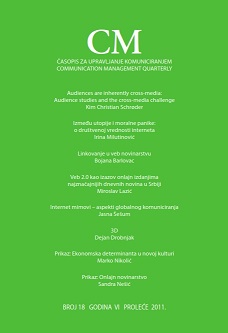Između utopije i moralne panike: o društvenoj vrednosti interneta
Between Moral Panic and Utopia: The Social Value of the Internet
Author(s): Irina R. MilutinovićSubject(s): Media studies, Ethics / Practical Philosophy, Social Philosophy, Social Informatics
Published by: Fakultet političkih nauka Univerziteta u Beogradu
Keywords: Internet; virtual communication; moral panic; Internet paradox; Uses and gratification theory; Bandura’s Theory of self-efficiency;
Summary/Abstract: One of the most topical issues of communication is the problem of the implications of virtual communication via the Internet on sociability of the individual and his social and communication effects. The first part of this study presents a theoretical discussion among the scientists. There are authors who represent the opposite - utopian and dystopian views on the effects of Internet-mediated communication on communication, social, and cultural preferences of its users. It points to the fact that the Internet, enabling the creation and development of a fundamentally new form of communicative practice (virtual communication), introduced the revolutionary societal changes. These changes received with disapproval as a moral panic by supporters of traditional social and cultural forms. The second part is presented, in chronological order, a series of empirical studies and findings based upon them, from the beginning of the eighties until today, which in practice verified the effects of the Internet on the psychosocial habit of the individual and society as a whole. Recent studies have previously reviewed the methodology used and refined experimental conditions, and through the prism of the Theory of use and enjoyment and Bandura’s theory of self-efficacy, led to the reformulation Internet paradox.
Journal: CM Komunikacija i mediji
- Issue Year: 6/2011
- Issue No: 18
- Page Range: 29-57
- Page Count: 29
- Language: Serbian

